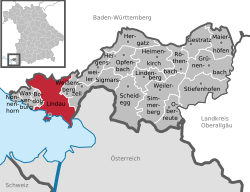Aeschach
| Lindau | ||
|---|---|---|

Aerial view of Lindau Island
|
||
|
||
| Coordinates: 47°32′50″N 9°41′00″E / 47.54722°N 9.68333°ECoordinates: 47°32′50″N 9°41′00″E / 47.54722°N 9.68333°E | ||
| Country | Germany | |
| State | Bavaria | |
| District | Lindau | |
| Government | ||
| • Mayor | Dr. Gerhard Ecker (SPD) | |
| Area | ||
| • Total | 33.18 km2 (12.81 sq mi) | |
| Elevation | 401 m (1,316 ft) | |
| Population (2015-12-31) | ||
| • Total | 25,132 | |
| • Density | 760/km2 (2,000/sq mi) | |
| Time zone | CET/CEST (UTC+1/+2) | |
| Postal codes | 88131 | |
| Dialling codes | 08382 | |
| Vehicle registration | LI | |
| Website | lindau.de | |
Lindau (officially in German: Lindau (Bodensee)) is a major town and an on the eastern side of Lake Constance (Bodensee in German). It is the capital of the Landkreis or county Lindau, Bavaria, and located near the borders of Austria (Vorarlberg) and Switzerland (St. Gallen and Thurgau). The coat of arms of Lindau town is a linden tree, referring to the supposed origin of the town's name (Linde means linden tree in German). The historic town of Lindau is located on an 0.68-square-kilometre (0.26 sq mi) island, which is connected with the mainland by a road-traffic bridge and a railway dam leading to Lindau station.
The first use of the name Lindau was documented in 882 by a monk from St. Gallen, stating that Adalbert (count of Raetia) had founded a nunnery on the island. However the remains of an early Roman settlement dating back to the 1st century have been found in the district of Aeschach.
In 1180, St. Stephan's church was founded. In 1224 the Franciscans founded a monastery on the island. In 1274/75 Lindau became an Imperial Free City under King Rudolf I. The terminology 'city' here means German Große Kreisstadt, which is an exception due to Lindau's rather small population of only c. 24454. In 1430, about 15 of Lindau's Jews were burned at the stake after being accused of murdering a Christian child. In 1528, Lindau accepted the Protestant Reformation. Lindau first followed the Tetrapolitan Confession, and then the Augsburg Confession. In 1655, after the Thirty Years' War, the first Lindauer Kinderfest (children's festival) was held, in memory of the war. This festival introduced by Lindau councillor Valentin Heider makes up an important part of the town's identity nowadays, too.
...
Wikipedia



